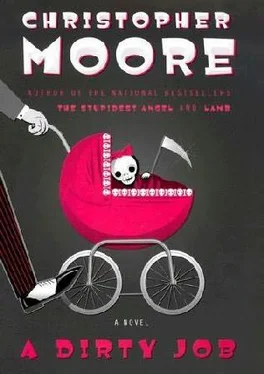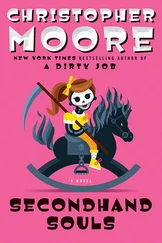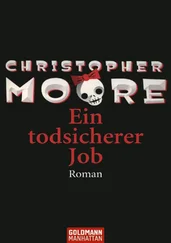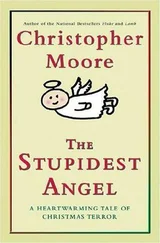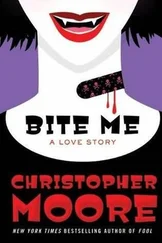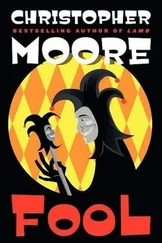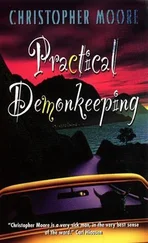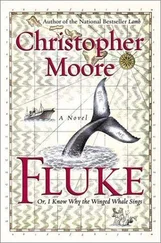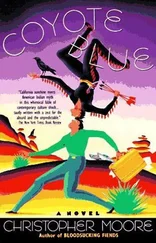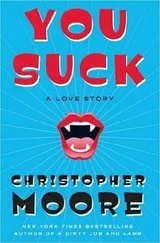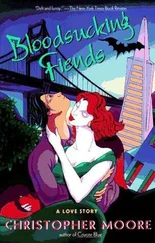“Oh, nothing,” said Mrs. Ling. “Bird break window and scare us. Not so bad now.”
Charlie looked to Mrs. Korjev. “Where?”
“On our floor. We are talking in hall. Speaking of what is best for Sophie, when boom, bird hits window and black ink run through window. We run here and lock door.” Both the widows had keys to Charlie’s apartment.
“I’ll have it fixed tomorrow,” Charlie said. “But that’s all. Nothing—no one came in?”
“Is third floor, Charlie. No one comes in.”
Charlie looked to the fishbowl. “What happened there?”
Mrs. Ling’s eyes went wide. “I have to go. Mah-jongg night at temple.”
“We come in, lock door,” explained Mrs. Korjev. “Fish are fine. Put Sophie in car seat like always we are doing, then go look in hallway for coast to be clear. When Mrs. Ling look back, fish are dead.”
“Not me! Is Russian who see dead fish,” said Mrs. Ling.
“It’s okay,” Charlie said. “Did you see any birds, anything dark in the apartment?”
The two women shook their heads. “Only upstairs,” Mrs. Ling said.
“Let’s go look,” Charlie said, moving Sophie to his hip and picking up his sword-cane. He led the two women to the little elevator, did a quick assessment of Mrs. Korjev’s size versus the cubic footage, and led them up the stairs. When he saw the broken bay window he felt a little weak in the knees. It wasn’t so much the window, it was what was on the roof across the street. Refracted a thousand times in the spiderwebbed safety glass was the shadow of a woman that was cast on the building. He handed the baby to Mrs. Korjev, approached the window, and knocked a hole in the glass to see better. As he did, the shadow slid down the side of the building, across the sidewalk, and into the storm drain next to where a dozen tourists had just disembarked from a cable car. None of them appeared to have seen anything. It was just past one and the sun was casting shadows nearly straight down. He looked back at the two windows.
“Did you see that?”
“You mean break window?” Mrs. Ling said, slowly approaching the window and peering through the hole Charlie had made. “Oh no.”
“What? What?”
Mrs. Ling looked back at Mrs. Korjev. “You are right. Flowers need water.”
Charlie looked through the hole in the window and saw that Mrs. Ling was referring to a window box full of dead, black geraniums.
“Safety bars on all the windows. Tomorrow,” Charlie said.
Not far away, as the crow flies, under Columbus Avenue, in a wide pipe junction where several storm sewers met, Orcus, the Ancient One, paced, bent over like a hunchback, the heavy spikes that jutted from his shoulders scraping the sides of the pipe, throwing off sparks and the smell of smoldering peat.
“You’re going to fuck up your spikes if you keep pacing like that,” said Babd.
She was crouched in one of the smaller pipes to the side, next to her sisters, Nemain and Macha. Except for Nemain, who was beginning to show a gunmetal relief of bird feathers over her body, they were devoid of depth; flat absences of light, absolute black even in the gloom filtering down through the storm grates—shadows, silhouettes, really—the darker ancestors of the modern mud-flap girls. Shades: delicate and female and fierce.
“Sit. Have a snack. What good to take the Above if you look like hell in the end?”
Orcus growled and spun on the Morrigan, the three. “Too long out of the air! Too long.” From the basket on his belt he hooked a human skull on one of his claws, popped it in his mouth, and crunched down on it.
The Morrigan laughed, sounding like wind through the pipes, pleased that he was enjoying their gift. They’d spent much of the day under San Francisco’s graveyards digging out the skulls (Orcus liked them decoffinated) and polishing off the dirt and detritus until they shone like bone china.
“We flew,” said Nemain. She took a moment to admire the blue-black feather shapes on her surface. “Above,” she added unnecessarily. “They are everywhere, like cherries waiting to be stolen.”
“Not stolen,” said Orcus. “You think like a crow. They are ours for the taking.”
“Oh yeah, well, where were you? I got these.” The shade held up William Creek’s umbrella in one hand and the fur jacket she’d ripped away from Charlie Asher in the other. They still glowed red, but were rapidly dimming. “Because of these, I was Above. I flew.” When no one reacted, Nemain added, “Above.”
“I flew, too,” said Babd timidly. “A little.” She was a tad self-conscious that she’d manifested no feather patterns or dimension.
Orcus hung his great head. The Morrigan moved to his side and began stroking the long spikes that had once been wings. “We will all be Above, soon,” said Macha. “This new one doesn’t know what he is doing. He will make it so we can all be Above. Look how far we’ve come—and we are so close now. Two Above in such a short time. This New Meat, this ignorant one, he may be all we need.”
Orcus lifted his bull-like head and grinned, revealing a sawmill of teeth. “They will be like fruit for the picking.”
“See,” said Nemain. “Like I said. Did you know that Above you can see really far? Miles. And the wonderful smells. I never realized how damp and musty it is down here. Is there any reason that we can’t have a window?”
“Shut up!” growled Orcus.
“Jeez, bite my head off, why don’t you.”
“Don’t tease,” said the bullheaded Death. He rose and led the other Deaths, the Morrigan, down the pipe toward the financial district, to the buried Gold Rush ship where they made their home.
PART TWO
SECONDHAND SOULS
Do not seek death. Death will find you.
But seek the road which makes death a fulfillment.
— Dag Hammarskjöld
Mornings, Charlie walked. At six, after an early breakfast, he would turn the care of Sophie over to Mrs. Korjev or Mrs. Ling (whoever’s turn it was) for the workday and walk—stroll really, pacing out the city with the sword-cane, which had become part of his daily regalia, wearing soft, black-leather walking shoes and an expensive, secondhand suit that had been retailored at his cleaner’s in Chinatown. Although he pretended to have a purpose, Charlie walked to give himself time to think, to try on the size of being Death, and to look at all the people out and about in the morning. He wondered if the girl at the flower stand, from whom he often bought a carnation for his lapel, had a soul, or would give hers up while he watched her die. He watched the guy in North Beach make cappuccinos with faces and fern leaves drawn in the foam, and wondered if a guy like that could actually function without a soul, or was his soul collecting dust in Charlie’s back room? There were a lot of people to see, and a lot of thinking to be done.
Being out among the people of the city, when they were just starting to move, greeting the day, making ready, he started to feel not just the responsibility of his new role, but the power, and finally, the specialness. It didn’t matter that he had no idea what he was doing, or that he might have lost the love of his life for it to happen; he had been chosen. And realizing that, one day as he walked down California Street, down Nob Hill into the financial district, where he’d always felt inferior and out of touch with the world, as the brokers and bankers quickstepped around him, barking into their cell phones to Hong Kong or London or New York and never making eye contact, he started to not so much stroll, as strut. That day Charlie Asher climbed onto the California Street cable car for the first time since he was a kid, and hung off the bar, out over the street, holding out the sword-cane as if charging, with Hondas and Mercedes zooming along the street beside him, passing under his armpit just inches away. He got off at the end of the line, bought a Wall Street Journal from a machine, then walked to the nearest storm drain, spread out the Journal to protect his trousers against oil stains, then got down on his hands and knees and screamed into the drain grate, “I have been chosen, so don’t fuck with me!” When he stood up again, a dozen people were standing there, waiting for the light to change. Looking at him.
Читать дальше
